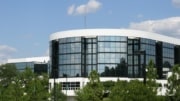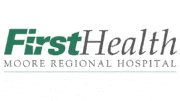PINEHURST – Last October, just a week shy of her 44th birthday, Julia Brokmeyer of Southern Pines was lying very seriously ill in a hospital bed. Days earlier, she had had a rare type of heart attack caused by a serious and unexpected condition. Though her cardiologists at the Reid Heart Center at FirstHealth Moore Regional Hospital tried many treatments, she wasn’t getting better. So at one point, she felt the need to give her teen son some encouragement for his future, “just in case.”
“I was facing a type of heart catheterization that was very risky, but it was the only chance I had,” she says. “I prayed with my oldest son, and I told him, ‘I want you to know that you and your brother are the best thing that ever happened to me besides marrying your Dad.’”
But hours later, waiting for the procedure to begin, her fears suddenly disappeared. “I was in the cath lab, and the feeling I had was wild,” she says. “Although I hadn’t had any anesthesia or other medicines yet, I had a great peace. I knew I’d be okay.”
In addition to prayers, Brokmeyer had come quickly to trust her cardiology team, she says. It was Steven Kent, M.D., FirstHealth cardiologist, who first diagnosed her correctly with a very rare heart condition called SCAD, or spontaneous coronary artery dissection. “Dissection” refers to the fact that an actual tear in the wall of the coronary artery had led to a heart attack. For most heart attacks, on the other hand, the cause is a build-up of plaque in the arteries.
SCAD causes a low percentage of heart attacks overall. But for people under age 50—even those like Brokmeyer who are otherwise healthy and not overweight—the numbers are eye opening. SCAD causes four out of every 10 heart attacks in this age bracket. And nine out of 10 are women like Brokmeyer. To further complicate diagnosis, there are no warning signs.
For these reasons, many emergency providers nationally mis-diagnose the condition as indigestion, and send patients home. In fact, Brokmeyer herself thought she had indigestion. But Dr. Kent wasn’t convinced. Looking at her tests, he immediately suspected SCAD. A heart catheterization (to diagnose the condition, not treat) confirmed the damage to her artery.
Though very sick in the days after diagnosis, Brokmeyer also learned to trust Patrick Simpson, M.D., an interventional cardiologist at FirstHealth.
“He told us they wanted to try medicines to treat it first, because the next option was a catheterization to insert a stent to repair it,” she says. “Since the artery was already torn, that would be really risky because it could tear the artery further.”
After a few days and with the medicine not achieving the best results, her team determined that the stent was the best next step.
“My doctors told me it was a difficult procedure, and it could lead to a heart bypass,” Brokmeyer says. “It was a very scary decision for me and my husband.”
That’s when they turned to prayer, and when she had that sweet message for her older son.
“This kind of thing really makes you appreciate your family and your life,” Brokmeyer says. “My husband was amazing, and my relatives and friends were too.” Her husband took over her Facebook page to update friends and family. Soon, they had word from people locally and across the world. The message, “we’re praying for you.”
Today, she is okay. The stent placement was a complete and immediate success.
“My husband knew it was the minute he saw Dr. Kent’s face,” she says. “Dr. Kent was so caring, and it was clear that he and the entire staff at FirstHealth know exactly what they’re doing.”
Just two days later, Brokmeyer was home.
She is so thankful for her recovery that she has shared on Facebook her amazing story of care at FirstHealth’s Reid Heart Center. She’ll also be featured at the American Heart Associations’ 7th Annual Sandhills Go Red for Women Luncheon, sponsored in part by FirstHealth Moore Regional Hospital, on Friday, February 23, in Fayetteville.
Her message is twofold.
“First, listen to your body,” she says. “I’m ‘too young and healthy’ to have a heart attack, but I did. So even if what you think is not possible, get help anyway. It could save your life.”
Her second message is one of thanks.
“I feel so blessed to have FirstHealth in our community,” she says. “I thank the doctors and nurses who took me seriously and did what they needed to do to find and perform the right treatment. They ultimately saved my life.”
For more information on FirstHealth’s heart services, visit www.firsthealth.org/heart.










